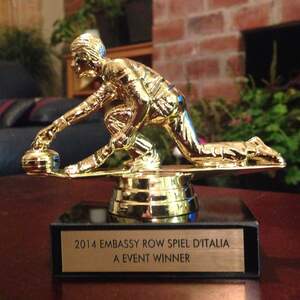We all know that on paper, some teams look like certain winners, while other look to have some serious burdens. We also, I hope, all know that actual performance involves more than what can be quantified. It involves team dynamics and leadership. Particularly when a team and its leader perform from a place of gratitude, they can do some amazing things.
Without gratitude
I have a very clear memory of playing in a bonspiel (aka a curling tournament) not from a place of gratitude. All four players on our team that weekend had recently been playing well in league night games. Everyone had been playing for multiple years. We all wanted to win. Yet, we lost three straight games and then had to watch the rest of the weekend. That memory brings a mix of emotions – frustration, embarrassment, self-doubt.
As the leader, in my quest to win, I intensely focused on figuring out the ‘right’ strategy for the shots to call, and on looking for weaknesses in the other teams. When I think about watching competitive curling on television, those announcers don’t know what the players are thinking and feeling, so most of their banter for the audience is about strategic choices and visible weaknesses. So in hindsight, it kind of makes sense that I assumed the path to greater competitiveness was to focus on the same things the announcers did.
Basically, I was so absorbed in trying to be clever enough to win, that I admittedly was a useless leader. My choices were based on theory, not on what my teammates could actually do well. My communication was to transfer data and instructions, not to actually connect with my teammates. My view of my teammates had narrowed down solely to their technical abilities, not on the dynamic environment we were in.
What I hadn’t considered
It stung, but after a while I did become grateful for that weekend. Afterwards, I was able to see the conditions I had unknowingly created, that did not bring out the best performance in any of us. I had never really thought about how technical or mechanical skill could be variable, and could thrive or crumple in different circumstances; that quality wasn’t a constant. I started to notice when I played closer to my highest potential versus when I showed up little better than the disinterested roommate of a beginner who needed a ride to the rink. I was starting to recognize more subtle motivators, and alternative ways besides ‘being clever’ to lead a team.
Value of competition
I highly value competitiveness. It takes courage to present yourself to be tested and judged. Having a goal that involves pressure and measures your progress can be the opening to tap into deeper capabilities. Stepping out of safety and into a forum where I push myself and perhaps we all elevate, can be transformational. The magic is in finding the balance of competitiveness with the joy of the pursuit itself.
An Unlikely Team
I have another very clear memory of playing in a bonspiel but this time from a place of gratitude. On paper, we wouldn’t have had good odds. As a foursome, we had never all played together before. One player generally understood the game but was a beginner with a few lessons. One player hadn’t played in a while. One player was having some back pain. But they were all good friends I hadn’t spent time with in years, and two had traveled a great distance. We were grateful to be together, to the sport that had introduced us to each other, and to the opportunity to play a game we loved.
We wanted to play our best. We wanted to be competitive and have some good games. We wanted to do well by each other. So we supported each other. We laughed when an errant shot randomly did something helpful. We swept when we could, but we didn’t rely on it for perfection. We didn’t look for perfection at all, nor cleverness. We looked at each other, chatted with each other, and exchanged ideas. I was grateful to my teammates for showing up with what they could offer, and found myself rooting for them rather than commanding them.
With Gratitude
We won some games. And we had some fun meals together. And we told stories and reminisced. And we won some more games. The beginner didn’t suddenly become a pro. The rusty player didn’t lose all of the rust. The bad back didn’t get better. Nothing on paper changed, and the gratitude we arrived with didn’t change either. Well perhaps the gratitude actually grew. The beginner could have gotten discouraged, but we were grateful for her enthusiasm which may have helped it continue. The one in pain could have also gotten discouraged, but we were grateful too for his determination and creative adaptations to be of service to the team.
We won the whole thing.
I get the biggest smile and warmest heart when I think about that weekend. I didn’t have a clever strategy. I didn’t have masterful hero shot-making. I focused on being grateful for what others brought to the team, including their trust and support of me. I focused on creating an environment where we could perform as best we could, that specific weekend, in that moment, playing together. That would have been enough had we lost.
But I am grateful to have an actual souvenir trophy of that weekend too!


